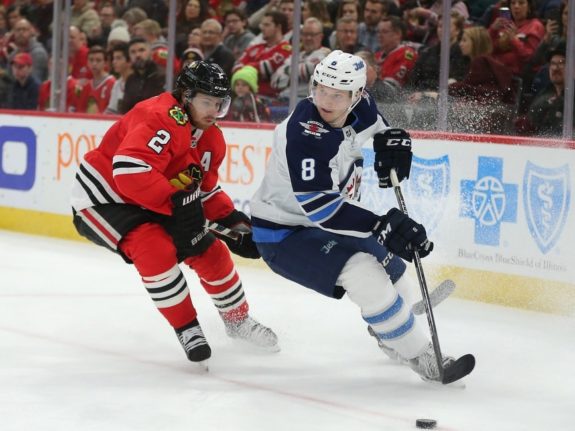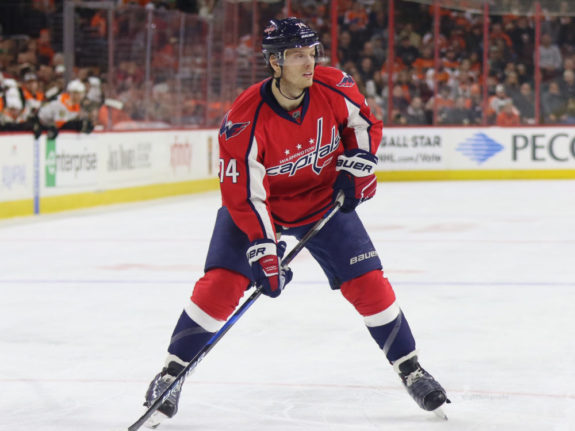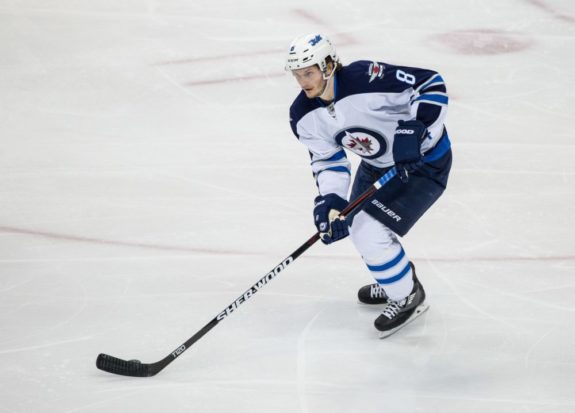Be assured that the John Carlson contract has snapped both the Winnipeg Jets and Jacob Trouba to attention.
Last week, the Washington Capitals defenseman, fresh off his hoisting the Stanley Cup, capitalized on his career-best 68-point campaign by inking a lucrative eight-year deal worth $64 million.
Wow
RT @Capitals: OFFICIAL: HE'S ALL OURS! @JohnCarlson74 signs an eight-year contract to stay in Washington! Average annual value of $8 million.More Details: https://t.co/j5uD678y6w#ALLCAPS pic.twitter.com/V0R7us3W2y
— Victor Sorrentino (@vic_sorrentino) June 25, 2018
Nothing exists in a vacuum — every signing has the potential to impact other teams’ negotiations with similar players— in this case, top-four defensemen. The question in Winnipeg is how the Carlson deal will influence talks between general manager Kevin Cheveldayoff and restricted free-agent Jacob Trouba — who’s a stalwart presence on the Jets’ blue line and logs big minutes against opponents’ top players — and which side has the leverage as a result of the deal in D.C.
At First Glance…Trouba Wins
It may seem like the Carlson contract gives Trouba negotiating power and shows it’s a buyers’ market, where demand exceeds supply and those offering their services can hold out for handsome rewards.

The contract might tempt Trouba to say “he’s a top-four, puck-moving, cornerstone defenseman. I’m a top-four, puck-moving, cornerstone defenseman. Eight million dollars, please.”
However, it’s not that simple — NHL negotiations rarely are. Not all top-four defensemen are created equal, or deserve the same amount of scratch. When you take a closer look, you can see shortcomings in Trouba’s game in comparison to Carlson’s that illuminate why he doesn’t deserve a Carlson-esque contract.
Carlson’s Got the Edge on Trouba in Key Areas
You know — the areas that most tempt general managers to open their wallets wide.
“What the Carlson deal proves,” Winnipeg Free Press columnist Paul Wiecek wrote recently, “is that you need to have a strong offensive component to your game and durability — two things Trouba has struggled with in his career — if you’re going to land a big bucks, long-term deal as an NHL top-pairing defenseman.”

Indeed, comparing the two’s statistics — both in points and games played — shows Carlson is in another echelon altogether.
Carlson has 333 points in 608 career NHL contests, all with the Capitals. He’s put up 37 or more in five straight seasons. In the 2018 Stanley Cup playoffs, he was a monster, putting up five goals and adding 15 assists.
Trouba is not as prolific offensively. His best season, points-wise, came in his 2016-17 campaign, where he had 33 in 60 games. His numbers dropped off in 2017-18, where he had 24 in 55. Trouba had just three points in 17 playoff games.
Carlson’s produced an average of .547 points per game, while Trouba’s produced an average of .395.
Carlson also has the edge on Jacob Trouba in the durability department. In his nine-year NHL career, he’s suited up for all 82 games in five different years. Trouba, comparatively, has struggled to stay healthy, missing at least 17 games due to injury four out of his five seasons. In 2017-18, he missed significant time with a lower-body injury.
Carlson’s superiority in these two key areas have the potential to swing the leverage back in Cheveldayoff’s favour, and should be things he points out during summer negotiations.
Will Contract Talks Turn Sour Again?
Just because, from an objective standpoint, Trouba isn’t worth as much as Carlson, doesn’t mean he won’t be asking for a similar figure. Recent rumours indicate the 24-year-old is looking to fetch a similar price.
McKenzie on Jacob Trouba: “I’m not reporting it is an accurate number, I’m just saying, there is a lot of speculation he’s looking in the $8M per year range.” #NHLJets
— NHL Watcher (@NHL_Watcher) June 28, 2018
If this is true, Trouba’s either seriously deluded or artificially and intentionally inflating his value to see if Cheveldayoff will bite.
The Jets’ boss won’t. He’s too savvy, and the organization-friendly deals he’s struck with elite stars Mark Schiefele and Nikolaj Ehlers in past years prove it. Pumping $8 million annually into Trouba would kneecap the Jets and be a big blow to everything else they want to accomplish in the future, such as re-upping Connor Hellebuyck, Blake Wheeler, as well as Patrik Laine and Kyle Connor after their entry-level deals expire next year.
Trouba and his agent, Kurt Overhardt, have been known to play hardball when they don’t get what they want — Trouba’s 2016 contract holdout (although that was about what side he played on, not about money) is undoubtedly still in the organization’s mind.
Trouba and Overhardt went public in early June saying they wanted to sign a new deal as soon as possible, calling the holdout ancient history and not something they wanted to repeat. However, it’s been nearly a month since then and there’s been no news. Talk is cheap anyway, and people are prone to get a bit nasty when discussing matters of money.
It’s worth noting the holdout actually cost Trouba money. The Jets offered a six-year deal worth $5.5 million per year that he turned his nose up at. However, as the Dec. 1 RFA deadline loomed and teams didn’t come breaking down his door like he thought they would, he was forced to settle for a two-year bridge deal worth a modest $6 million. Perhaps Trouba and Overhardt have learned their lesson from last time.
Jets Need Trouba, Just Not at $8 Million
Even though he shouldn’t fetch $8 million, the Jets need Trouba. He logs top minutes, has formed a great shutdown pair with Josh Morrissey, and has a nasty physical edge to his game. He was one of the key reasons for the Jets’ much-improved penalty kill, and at just 24-years-old, his offensive instincts still have room to improve. With the Jets poised to be a Cup contender for the next several years, he’s exactly the type of player they need on their back-end.

The Hockey Writers’ own Rob Mahon speculated back in January how much of a raise Trouba could be in for. Some comparable players include the Anaheim Ducks’ Hampus Lindholm, who makes $5.2 million per year, and the Toronto Maple Leafs’ Morgan Rielly, who makes $5 million even.
The problem here is that Trouba has shown in the past he’s looking for more money than Lindholm,” Mahon wrote. “And given his value to the team, he’ll likely get it. If he signs for less than $6 million per season, it would come as a surprise.
Cheveldayoff may have the leverage, but still has to be careful. He’s got a big challenge ahead to retain all the players he’d like to while staying cap-compliant. He has to offer Trouba a contract enticing enough to make the D-man stay while being careful not to overpay.
The Jets could probably live with paying $6 million per year for Trouba, but can he? We’ll see. One thing is clear, though: if Trouba is going to get ‘Carlson money’, it’s not going to be from the Jets, but from another team who has overspent.